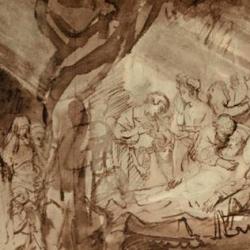At the end of Albert Camus’s The Stranger, the narrator is on death row for killing an Arab. Death is familiar to him. It is the “black wind” that has blown through his entire life.
For Camus’s Stranger, the inevitability of death makes life indifferent. It does not matter whether or not he loved his mother, whether his mistress is kissing another man, whether he murdered an Arab. Nothing matters because he is going to do and the world will go on without him.
Everyone dies alone, and Camus recognizes that if death is final, then everyone is always alone. What we do to others, what others to do us, does not ultimately matter.
Death isolates. Death individualizes. The rule of death is the rule of pure individualism.
By contrast, resurrection is a corporate hope, the confidence that we will pass through death to rejoin one another in a new heavens and new earth.
As Peter Saccio has said, Shakespearean tragedy climaxes in individual deaths. Shakespearean comedy, by contrast, climaxes in rebirth. Tragedy is the end of each one; comedy expresses the hope of the race.
Perhaps individualism is essentially disbelief in resurrection.















